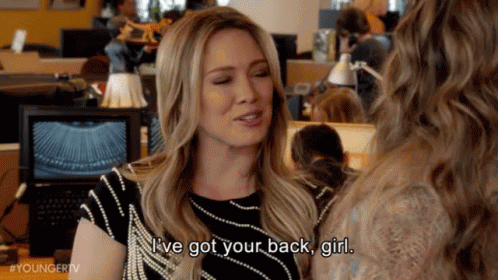
At some point in our lives, it’s likely that we’ll all need help for our mental health in one way or another. Mental health conditions like depression and anxiety are very common — almost half of all Australians will experience some form of mental illness in their lifetime. Sometimes, a conversation with a loved one is all it takes to release the stress you’re feeling and give you a new perspective. But other times there’s a little more going on, and in these times, there’s absolutely no shame in seeking professional help, or taking advantage of the resources available online around the clock.
If you’re not feeling like yourself or suspect you might need some professional help but don’t know where to start or are too nervous to take the first step, we’ve got you. It can seem really scary to ask for help but trust yourself, boo. If you have a feeling that you need to speak to someone about your mental health, well, it’s a pretty good indicator that you do.
We’ve broken down all of your options so you can get the help you need, ASAP.

Go straight to the professionals
If you’ve been feeling down, anxious or just not yourself for more than a couple of weeks, or the way you’re feeling is affecting your ability to cope at work, school or in your relationships, it might be time to speak to a professional about your mental health. If you feel ready, then the easiest way to figure out exactly what you need is to see your GP. Book an appointment and lay it all out for them — explain how you’ve been feeling and tell them about anything you’ve had going on.
If they tell you that you could benefit from a mental health care plan, don’t be alarmed. A mental health care plan is quite literally a plan to address your mental health concerns and it also makes your treatment more affordable. It’s actually completely normal (even for minor or short-term mental health concerns) and is an important step for your doctor to determine exactly what you need next — perhaps they’ll refer you to a psychologist, or sign you up for an online counselling program.
This is also an important step for anyone who feels like they don’t have a personal support network to reach out to — seeking professional help early will probably have a huge positive impact.
Speak to someone you trust
As we mentioned before, speaking to someone you trust about exactly what’s going on is a great place to start. Sometimes an honest conversation with your existing support network will shake out the cobwebs, help to stop the internal monologue from running wild, and will help you see things more clearly. Or maybe your mate will offer a fresh perspective and help you figure out what to do next.

Reaching out can be a bit daunting, so keeping it low-key by asking a trusted mate to go for a walk, grab a coffee, or get the conversation going by sharing a relatable meme could also help break the ice.
Think of what’s worked in the past
We know you’re a resilient person who’s made it through a hell of a lot already. Try to think of the ways that have worked for you at other times in your life (and avoid ones that didn’t — hello, drinking too much!). Maybe it was speaking to someone you trust or taking a walk around the block when you felt overwhelmed. Let those good strategies guide you when you’re feeling lonely, stressed, worried or overwhelmed. Becoming more aware of these could help you manage triggers, develop coping mechanisms to deal with challenges as they arise and help you feel more confident in reaching out for support.

When in doubt, go back to basics and focus your energy on the things you can control in your environment and the people you can lean on for support. Queensland Health has a heap of ideas to get you started, like catching the sunrise, reducing your caffeine, deep breathing or starting a veggie patch.
Take some time out for yourself
Deciding to take some me-time might not immediately make you feel like you’re seeking help, but it’s a great step towards looking after yourself better. Often when we get busy, the first thing to go out the door is time alone, but taking even a few minutes for yourself every day will work wonders. And if you’re already feeling the guilt creep in for even considering taking some time out, perhaps letting your partner, boss, friend, or family member know that you need to take a time out could help ease this.

A few ways to take time for yourself could be meditation, going for a walk, listening to your favourite podcast, or cooking your favourite dinner while listening to music. Me-time doesn’t always have to be alone time, either. For some of you, your idea of peak me-time is doing a BBQ with your mates and if that’s the case, you do you. All of these small, daily things will help boost your mental wellbeing, lift your mood, and help build resilience during tough situations.
Lean on telephone and online supports
If you’re not quite ready to go for an IRL appointment, online and telephone support lines are the way to go. These resources are available to anyone at any time and are also a great place to start for anyone living in a remote location or cannot physically access assistance. The great thing about speaking anonymously on the phone is that it can remove a lot of self-consciousness, so you’re less likely to downplay what you’re going through. That means, if you have even a whisper of a feeling that you might need help, then you are worthy of seeking (and getting) professional help, and that can be done immediately with one of these support networks.
Lifeline (13 11 14) and Beyond Blue (1300 224 636) are two incredible anonymous phone lines to call at any time of the day or night. You can also visit Queensland Health’s Your Mental Wellbeing website for loads more information on finding the right support line for your specific concerns.







